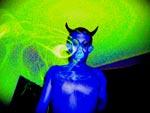| Author
|
What am I looking for in this analyzer?
|
Zoopy
IsraTrance Junior Member

Started Topics :
44
Posts :
538
Posted : Feb 18, 2008 22:59:11
|
|
Alot of things I read on the internet tell me to use an Analyzer for various reasons but I can't find anywhere that says what exactly I am looking for ? I mean, what does a bad mix or signal look like and what does a good one look like? OR anyplace I can learn to use it ? |

|
|
Elad
Tsabeat/Sattel Battle

Started Topics :
158
Posts :
5306
Posted : Feb 18, 2008 23:00
|
|
Zoopy
IsraTrance Junior Member

Started Topics :
44
Posts :
538
Posted : Feb 18, 2008 23:04
|
|
but that's also after it was mastered.. that has to make a difference, right? |

|
|
Medea
Aedem/Medea

Started Topics :
127
Posts :
1132
Posted : Feb 18, 2008 23:35
|
I use Pinguin audio meter a lot and I know how released tracks look like in there, so, when I master my tracks, I always look at the Pinguin.
Also, when producing and mixing I sometimes switch on the L2 on master channel, to see and hear how the track will sound approximately after mastering.
Also, I use the analyzer all the time when working with separate sounds. Sometimes sounds have some low frequencies that you don't hear in the mix, even after you apply a hi-pass eq, but if they are removed completely, the mix becomes more clear usually. So, I use analyzer to make sure that unneeded freaquencies are removed completely.
So, I use the Pinguin Audio Meter all the time, I am even planning to build a dual-screen setup, and the second screen will be used for the spectrum analyser always turned on.
[That is only a my way of work =)]
        http://soundcloud.com/aedem http://soundcloud.com/aedem |

|
|
mubali
Mubali

Started Topics :
71
Posts :
2219
Posted : Feb 18, 2008 23:50
|
I also use the analyzer to see the overall frequency balance. Sometimes there's sounds that bunch up in a certain frequency range, and your ears might tell you something different than the spectrum analzyer.... I do agree that using your ears should be first and foremost, but it never hurts to have something else to double check things.
        An Eagle may soar, but Weasels don't get sucked into jet engines. An Eagle may soar, but Weasels don't get sucked into jet engines. |

|
|
Suloo
IsraTrance Full Member

Started Topics :
87
Posts :
2822
Posted : Feb 19, 2008 00:08
|
hm..i use izotope ozone..everything is bypassed.. i use it just to look at frequency spectrum ,correlation meter and to check rms and peak level..so what i do is to take care there are no interfernces between the sounds..like i solo two sounds and have a look at correlation meter..if its inbetween 0 and +1 its good=no interferences and probably good use of stereo spectrum..if its below 0 all the time..its really bad..sometimes it goes below 0 cause of some delays or something..but i think its not that bad..
then i take care of the levels..like usually i level them with 10db differece between rms and peak level..so the mastering egineer can take good advantage of the limiter..
fq spectrum to check the subs in any signal like mentioned before..
there is even another one wich i forgot the name right now..its right below the correlation meter..use it to check if there is good use of stereo spectrum with panorama for example..as soon as your mono kick and bass drops in the correlation meter becomes unusable..so then i have a look there..and for interferences between bass and kick i just use my ears..but it becomes better and better with some time and training..
good luck!
i`m sure there are more options i could use in ozone but i haven`t figured out so far..
anyone maybe?
greez mark
        -------......-------...-..-..-..-.-.-.-.- -------......-------...-..-..-..-.-.-.-.- |

|
|
MadScientist
IsraTrance Full Member

Started Topics :
97
Posts :
1220
Posted : Feb 19, 2008 01:16
|
the thing you mean is probably a geniometer 
in my opinion its a really usefull tool to check the stereo image of your track...how it works is like what you see is what you get, the best thing is if it shows a kinda round graph...if it looks kinda crazy with big peaks, there are some things fucked up in your track! to check the mono-compability, I always got logic's direction-mixer set to mono on the master channel and switch it on from time to time!
about spectrum analyzers, I mostly use the built-in ones in logic's eqs for the single sounds...mainly to see if there are some big low frequencies that you dont really hear, or to see where a big peak exactly sits in the spectrum when I want to lower it a bit...
on the whole track I mainly use logic's multimeter, you should try to get a kinda balanced spectrum of your track...but you shouldn't want to get a totally flat spectrum, I doubt that it will sound good  best way imo is to keep something like the fletcher-munson curve a bit in mind! best way imo is to keep something like the fletcher-munson curve a bit in mind!
        https://soundcloud.com/hazak https://soundcloud.com/hazak
"Have you ever had that feeling where you're not sure if you're awake or still dreaming?"
"Hmm, yeah... All the time, man - it's called mescaline. The only way to fly!" |

|
|
Tomos
IsraTrance Full Member

Started Topics :
84
Posts :
981
Posted : Feb 19, 2008 05:48
|
Madscientist - If you see spikes in the geniometer (or whatever phase analyser) how do you go about correcting phase problems.
Inverting the phase of elements that peak and Panning? I don't know whether this is the art or science part of mixing?
If the phase error peaks are big then you should be able to hear the problem in the form of masking/distortion.. right?
If you music sounds good, then I always though.. it is..
Does fixing error peaks in phase improve the sound and clarity of the mix?
What is the depth of sounds that can cause problematic phase peaks.. I mean, is it only sounds in the same frequency range that combine to case peaks? |

|
|
MadScientist
IsraTrance Full Member

Started Topics :
97
Posts :
1220
Posted : Feb 19, 2008 10:09
|
first I search the sound/combination by soloing...first the groups and then the sounds of the group where the peak appears...inverting the phase of that sound is defenately worth a try! if the peak occours cause it clashes with another sound, this can already solve the problem...if its just the sound alone that peaks already, its probably a problem in the synthpatch/ fx chain...most of the times (for me at least) this is caused by some sort of stereo effects, like stereo spread or some kind of binaural panning etc 
I dont really know if you can hear it everytime, most of the times I can you hear that something is masking a bit...but this is probably not the same on all systems, for example if there suddenly occurs some kind of distortion from it on a party pa, its not quite the thing you want to happen during a live right?
avoiding phase peaks mostly improves the clarity of a mix, because it mostly removes masking/clashing of 2 sounds or a sound with too heavy stereo effects 
        https://soundcloud.com/hazak https://soundcloud.com/hazak
"Have you ever had that feeling where you're not sure if you're awake or still dreaming?"
"Hmm, yeah... All the time, man - it's called mescaline. The only way to fly!" |

|
|